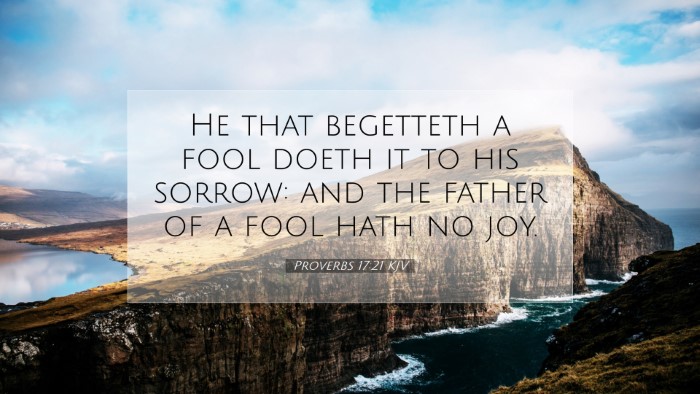Commentary on Proverbs 17:21
Proverbs 17:21 (KJV): "He that begetteth a fool doeth it to his sorrow: and the father of a fool hath no joy."
Introduction
The Book of Proverbs, attributed primarily to King Solomon, serves as a treasure trove of wisdom for living a righteous and fruitful life. Proverbs 17:21 encapsulates a profound truth regarding the consequences that arise from parenting folly and the inherent sorrow in fostering foolishness. This commentary seeks to explore insights from renowned public domain commentators including Matthew Henry, Albert Barnes, and Adam Clarke to provide a comprehensive understanding of this verse.
Verse Analysis
This proverb illustrates the relationship between a father and his child as it relates to wisdom and folly. The construction of the verse implies a cause-and-effect scenario where the act of begetting a fool leads to sorrow for the parent. It also highlights the emotional landscape of parental experience with children whose lives are marred by foolishness.
Insights from Matthew Henry
Matthew Henry emphasizes the painful reality of a parent’s influence in the development of a child. He writes that "the folly of a child is a reflection on the parent" and indicates that it is tragic when a parent witnesses their offspring embracing foolishness. He adds, "the father’s sorrow is compounded by the loss of joy that is meant to be cherished in the parent-child relationship." This sorrow arises not only from the consequences of the child’s actions but also from the reflection of parental failure to impart wisdom.
Albert Barnes' Commentary
Albert Barnes aligns with this notion, suggesting that the term "fool" signifies more than just intellectual deficiency; it also encompasses moral foolishness. He explains that "to beget a fool is a great calamity and focuses on the lack of joy from parenting a child who does not heed wisdom." Barnes further elaborates on how such a relationship may lead to societal implications where the foolish child may ultimately contribute negatively to the community, deepening the father's sorrow.
Adam Clarke's Perspective
Adam Clarke provides a nuanced interpretation by addressing the implications of parental responsibility. He posits that this verse suggests a cautionary tale for parents about the severe ramifications of neglecting their duty in nurturing their children's moral and intellectual growth. Clarke states, "the father of a fool hath no joy; for the foolishness of the son reflects back upon him, causing not just personal pain but public shame." He highlights the weighty responsibility entrusted to parents to cultivate wisdom and proper conduct, which can ultimately result in either joy or sorrow.
Expounding the Themes
- The Weight of Responsibility: Proverbs 17:21 underscores the significance of parental guidance. It illustrates that a child’s foolishness is not merely a personal failure but a communal grief. This provides a vital teaching moment, reinforcing the moral obligation parents have in nurturing their children’s character.
- Parental Sorrow: The verse articulates a deep emotional truth about the sorrow that accompanies watching a child stray into folly. It serves as a warning to avoid the pitfalls of complacency in parenting and encourages a proactive engagement in children's lives to steer them towards wisdom.
- Joy vs. Sorrow: The dichotomy of joy and sorrow outlined in this verse serves as a reminder that while children may bring joy through wisdom and righteousness, the opposite is equally true. The text prompts us to reflect on the paths we and our children choose, with wisdom leading to joy and folly inevitably begetting sorrow.
Practical Application
This verse can be seen as a call to action for current and future leaders, educators, and parents to diligently foster environments where wisdom is cultivated. The implications of Proverbs 17:21 extend beyond individual families into the broader society, urging communities to invest in youth through mentorship and guidance. Here are some actionable insights:
- Promote Wise Counsel: Families should prioritize wise counsel from trusted and capable mentors who can guide children in making sound decisions.
- Model Wisdom: Parents and leaders are encouraged to model wise behaviors, demonstrating integrity and thoughtfulness in their actions.
- Engage in Teaching: Structured teaching moments about the principles of wisdom and the dangers of folly can help children understand the consequences of their choices.
Conclusion
Proverbs 17:21 serves as a poignant reminder of the profound impact of parental guidance on a child's future. As echoed through the works of Matthew Henry, Albert Barnes, and Adam Clarke, the verse highlights the dire consequences of neglected wisdom in parenting, urging a reflective approach to our responsibilities. Understanding and internalizing this wisdom is essential, not only for parents but for anyone engaged in the development of future generations. The pursuit of wisdom is a noble endeavor that must be championed within families, communities, and the church, resonating through the lives we touch and guiding us towards fulfillment and joy.


